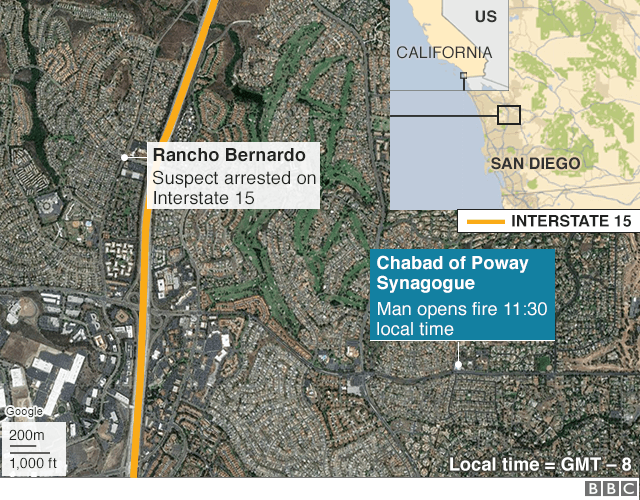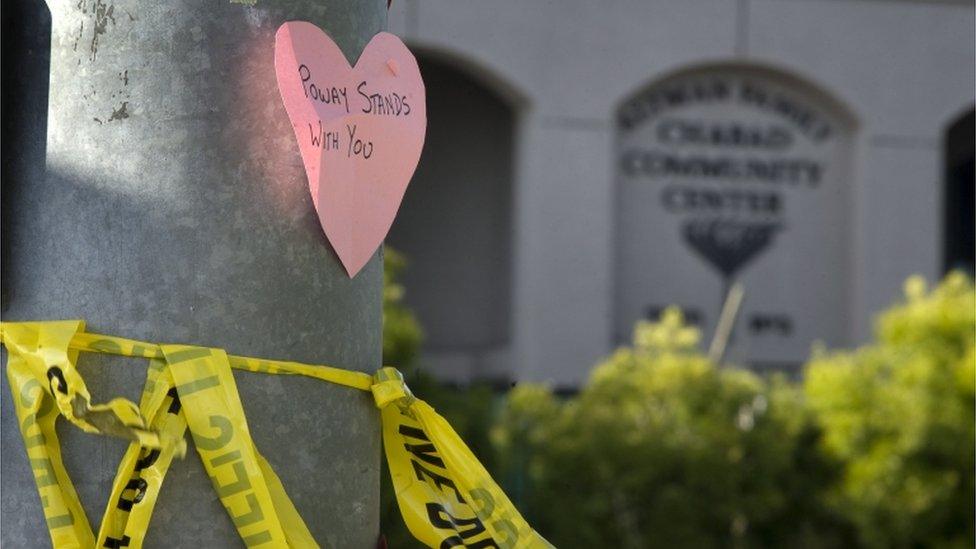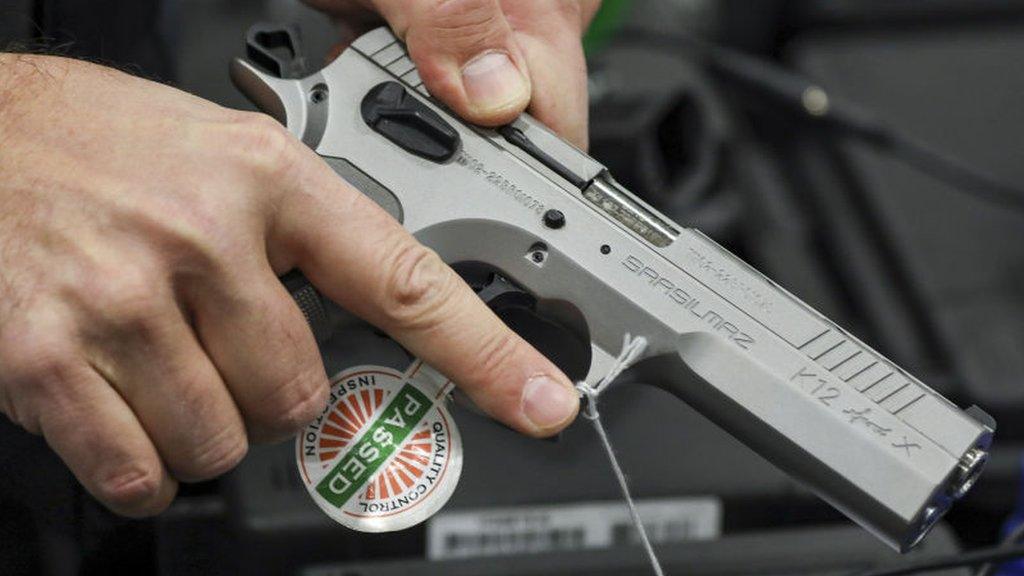San Diego synagogue shooting: Rabbi describes seeing attacker
- Published
The shooting happened at a synagogue in Poway, north of San Diego
A rabbi who was injured in the deadly shooting at a synagogue near San Diego on Saturday has described the moment he faced the gunman.
Rabbi Yisroel Goldstein says he lifted his hands when he saw the "murder terrorist". The man shot and the rabbi lost his right index finger.
One woman died and two other people were injured in the attack.
A 19-year-old man named as John Earnest was arrested shortly afterwards in Poway, north of the Californian city.
The attack comes exactly six months after a shooting in Pittsburgh in which 11 people were killed, thought to be the worst anti-Semitic attack in recent US history.
What did the rabbi say?
Rabbi Goldstein was walking into the banquet hall at the synagogue when he heard a noise - what he thought initially was a table falling over or a congregation member collapsing.
"As soon as he saw me, he started to shoot toward me and that is when I put my hands up," Rabbi Goldstein said on NBC's Sunday Today programme. "I cannot erase that face from my mind."
He held up his hands to shield himself but his fingers "got blown away".
Rabbi Yisroel Goldstein speaks to reporters about Saturday's attack
Rabbi Goldstein hurried through to the banquet hall where a number of children - including his granddaughter - were gathered.
"I just ran, not even knowing that my fingers were blown off and curled all the kids together and got them outside," he said.
Lori Kaye, who helped found the synagogue with Rabbi Goldstein, was shot dead in the attack.
"Everyone in the community knew her," he said. "I'm just so heartbroken and saddened by the senseless killing."
A 34-year-old man and a young girl suffered shrapnel wounds in the attack.


Worshippers attacked, again
By Martin Bashir, BBC religion editor
The routine is all too familiar. Another murderous attack on a place of worship, this time in San Diego, followed by the obligatory offer of prayers. "Thoughts and prayers to all those affected", tweeted President Donald Trump.
Then, during a brief on-camera statement, Mr Trump said it looked like a hate-crime. "Hard to believe," he added. Sadly, it is not hard to believe at all.
Anti-Semitic incidents in the US surged 57% in 2017 - the most recent data available - the largest year-on-year increase since the century-old Jewish advocacy group began collecting data in 1979, says the Anti-Defamation League (ADL), which monitors extremism in the US.
The horrendous attack in San Diego follows the deadliest attack on Jews in US history at the Tree of Life synagogue in Pittsburgh last October. It will now be added to the ADL figures. And the numbers, to tragic results, continue to rise.

How did the attack unfold?
Sheriff Gore said officers were called to the Chabad synagogue just before 11:30 (18:30 GMT) after the man opened fire with an "AR-15 type" assault rifle.
He said an off-duty border patrol officer had fired at the suspect as he fled the scene in a vehicle, but had not not hit him.
The suspect was later arrested by another officer, said San Diego chief of police David Nisleit.
"He clearly saw the suspect's vehicle, the suspect jumped out with his hands up and was immediately taken into custody," Mr Nisleit said.
"As the officer was placing this 19-year-old male into custody, he clearly saw a rifle on the front passenger seat of the suspect vehicle."
San Diego County Sheriff Bill Gore told reporters that investigators were reviewing the suspect's social media activity and examining a virulently anti-Semitic "open letter" published online.
In the letter, which appeared on the online forum 8chan hours before the attack, the author - who identified himself as John Earnest - said he had been inspired by the attack on two Christchurch mosques last month, as well as the Pittsburgh shooting last October.
The racist, anti-Semitic document that police are investigating in relation to the shooting makes 10 references to Robert Bowers - charged with killing 11 people at the Tree of Life synagogue in Pittsburgh - whom the author John Earnest calls an "inspiration".
Authorities later said Mr Earnest was under investigation in connection with a fire at a mosque last month.
How has the Jewish community reacted?
"All of the Jewish community across the country is concerned," Joel Rubin, a Democratic Strategist and member of the Tree of Life synagogue, told Fox News on Saturday. "My daughters go to Hebrew school and we see police cars often in front of the school, guarding it. That's not the situation in America we want to be living in."
Meanwhile, the Times of Israel published a blog post headlined, "Synagogue shootings - now a thing", external.

A message of support outside the Chabad synagogue near San Diego
In the aftermath of the Pittsburgh attack, members of the US Jewish community began openly questioning whether the era of seeing the US as a safe haven was over.
"I had been dreading and expecting this day, and more like it, for two years," wrote the Washington Post columnist Dana Millbank, in a column titled "Trump's America is not a safe place for Jews", external.
Mr Trump has publicly condemned anti-Semitism, and White House spokeswoman Sarah Sanders said it was "outrageous" to suggest he bore any responsibility for it, but many have accused him of using coded anti-Semitic language.
The ADL publicly called on him to stop using tropes such as "global special interests" and "those who control the levers of power" - both of which he ran in an ad alongside pictures of prominent Jews - as well as his claim that there were "very fine people on both sides" in Charlottesville, after white nationalists chanted "Jews will not replace us".
- Published17 December 2024

- Published4 October 2017
